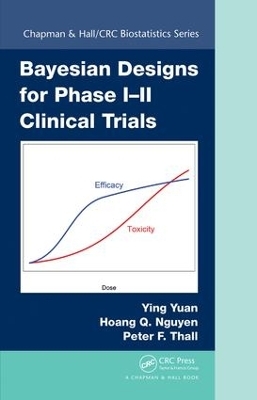
Bayesian Designs for Phase I-II Clinical Trials
Chapman & Hall/CRC (Verlag)
978-1-4987-0955-2 (ISBN)
Reliably optimizing a new treatment in humans is a critical first step in clinical evaluation since choosing a suboptimal dose or schedule may lead to failure in later trials. At the same time, if promising preclinical results do not translate into a real treatment advance, it is important to determine this quickly and terminate the clinical evaluation process to avoid wasting resources.
Bayesian Designs for Phase I–II Clinical Trials describes how phase I–II designs can serve as a bridge or protective barrier between preclinical studies and large confirmatory clinical trials. It illustrates many of the severe drawbacks with conventional methods used for early-phase clinical trials and presents numerous Bayesian designs for human clinical trials of new experimental treatment regimes.
Written by research leaders from the University of Texas MD Anderson Cancer Center, this book shows how Bayesian designs for early-phase clinical trials can explore, refine, and optimize new experimental treatments. It emphasizes the importance of basing decisions on both efficacy and toxicity.
Ying Yuan is a professor and co-chief of the Section of Adaptive Clinical Trials in the Department of Biostatistics at the University of Texas MD Anderson Cancer Center. He is also an adjunct associate professor in the Department of Statistics at Rice University. Dr. Yuan has published over 100 peer-reviewed research papers in top statistical and medical journals. He is an associate editor of Biometrics and a board member of the International Chinese Statistical Association. He received his PhD in biostatistics from the University of Michigan. His research interests include Bayesian adaptive clinical trial design, statistical analysis of missing data, and Bayesian statistics. Hoang Q. Nguyen is a senior computational scientist in the Department of Biostatistics at the University of Texas MD Anderson Cancer Center. He received his PhD in computational and applied mathematics from Rice University. His research interests include Bayesian clinical trial design, computational algorithms, regression modeling, and Bayesian data analysis. Peter F. Thall is the Anise J. Sorrell Professor in the Department of Biostatistics at the University of Texas MD Anderson Cancer Center. He is also an adjunct professor in the Department of Statistics at Rice University. Dr. Thall is a fellow of the American Statistical Association (ASA) and the Society for Clinical Trials, an associate editor for Clinical Trials and Statistics in Biosciences, and an ASA Media Expert. He has published over 200 papers and book chapters in the statistical and medical literature. He received his PhD in statistics and probability from the Florida State University. His research interests include clinical trial design, dynamic treatment regimes, prior elicitation, Bayesian nonparametric statistics, and personalized medicine.
Why Conduct Phase I-II Trials? The Phase I-II Paradigm. Establishing Priors. Efficacy-Toxicity Trade-Off–Based Designs. Designs with Late-Onset Outcomes. Utility-Based Designs. Personalized Dose Finding. Combination Trials. Optimizing Molecularly Targeted Agents. Optimizing Doses in Two Cycles. Optimizing Dose and Schedule. Dealing with Dropouts. Optimizing Intra-Arterial tPA. Optimizing Sedative Dose in Preterm Infants. Bibliography.
| Erscheinungsdatum | 24.05.2016 |
|---|---|
| Reihe/Serie | Chapman & Hall/CRC Biostatistics Series |
| Zusatzinfo | 63 Tables, black and white; 40 Illustrations, black and white |
| Sprache | englisch |
| Maße | 156 x 234 mm |
| Gewicht | 589 g |
| Themenwelt | Studium ► Querschnittsbereiche ► Epidemiologie / Med. Biometrie |
| ISBN-10 | 1-4987-0955-9 / 1498709559 |
| ISBN-13 | 978-1-4987-0955-2 / 9781498709552 |
| Zustand | Neuware |
| Informationen gemäß Produktsicherheitsverordnung (GPSR) | |
| Haben Sie eine Frage zum Produkt? |
aus dem Bereich


